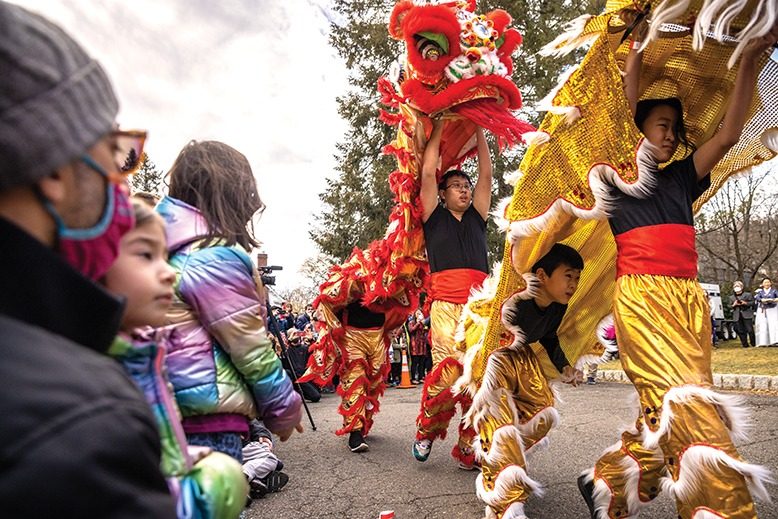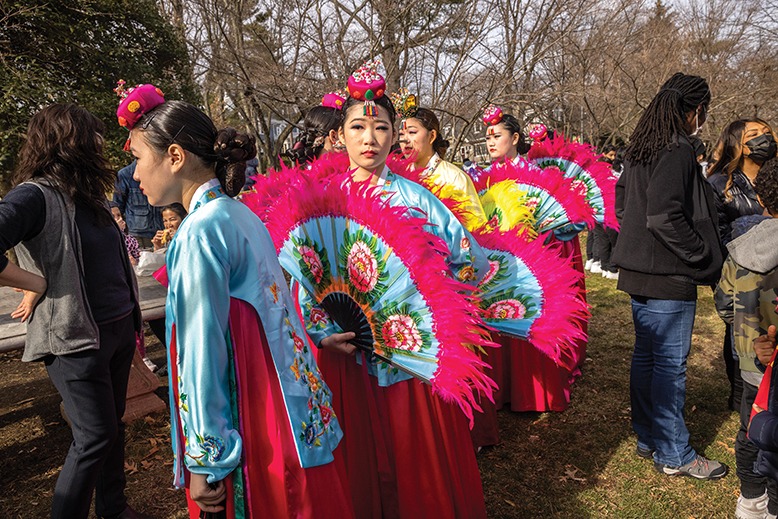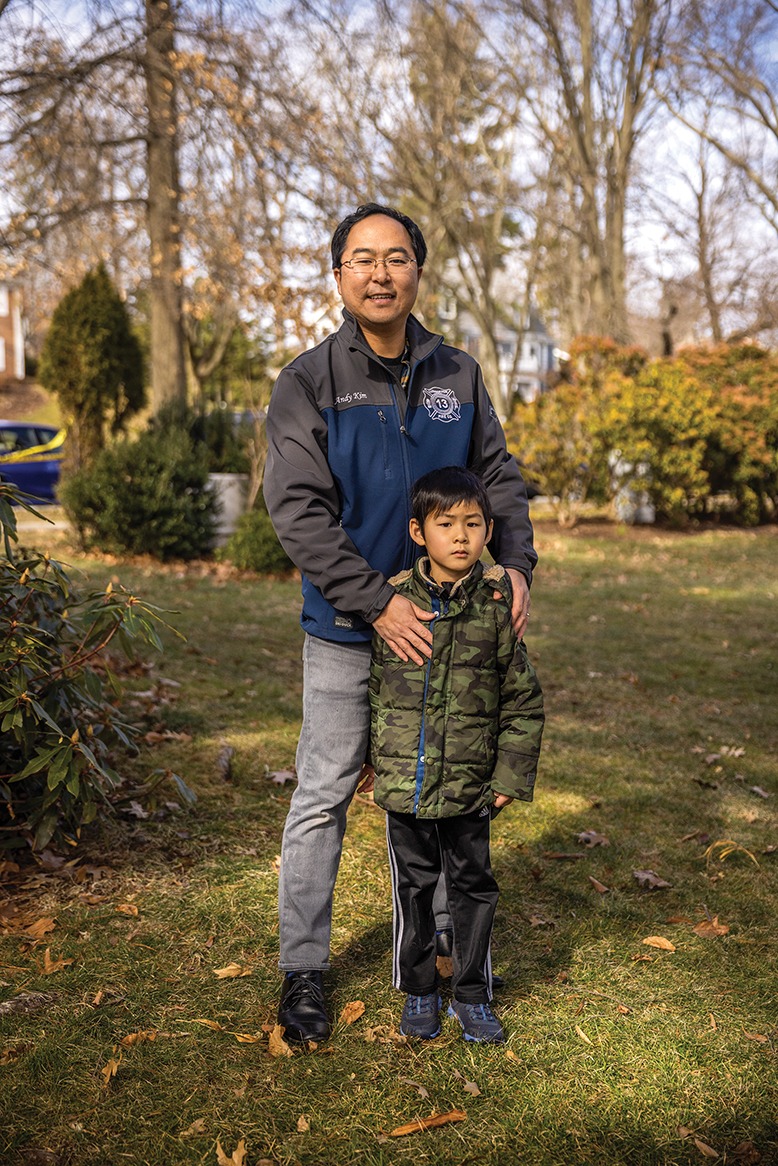
Amber Reed’s 10-year-old son, who is in fifth grade and is Korean American, was shocked when, at the start of the pandemic, his classmates began teasing him, asking if he was Chinese and if he had the coronavirus. When he was younger, and his mom packed him Asian food for lunch, he got into the habit of hiding his meal because some of the other boys in his class would make fun of it.
Reed, who lives in Montclair, says these types of microaggressions and racial traumas, which Asian Americans have experienced for years, are carried around with them all the time. Until recently, she says, many never spoke about the discrimination they faced, keeping the pain to themselves. “There’s this silence that we’ve all been complicit in for one reason or another,” says Reed, who works as a data analyst for the Montclair school district.
But now, she says, that’s finally starting to change. “This is a watershed moment, where we are finally opening up about what we and our children are experiencing.”
Reed and other activists hope that the shameful racial bias their kids have endured, especially in schools, will be addressed now that Governor Phil Murphy has signed landmark legislation requiring public schools in New Jersey to include Asian American and Pacific Islander (AAPI) history and achievements in their curriculums, starting in the upcoming 2022-23 school year.

The Korean Traditional Dance of Choomnoori organization performs the fan dance to celebrate the Lunar New Year in Montclair. Photo by Benjamin Norman
The law makes New Jersey the second state (Illinois was first) to require schools to teach the subject at all grade levels, K-12. Two South Asian American Democrats, Assemblyman Raj Mukherji and State Senator Vin Gopal, helped sponsor the bill.
The New Jersey Department of Education is also creating an Asian American Heritage Commission to advise school districts on how best to incorporate the material into their teaching plans. Lessons will focus on the history of AAPI people in the United States and their contributions, although further details had not been released as of press time. The commission is expected to begin meeting as soon as all of its appointments are made, possibly this spring. The timing would be opportune as May is AAPI Heritage Month.
“Highlighting the contributions of Asian Americans and Pacific Islanders for our students is critical in decreasing Asian bias in our country,” says Angelica Allen-McMillan, acting commissioner of education for the state.
AN URGENT NEED
Many say the need to address discrimination against Asian American children in schools is urgent, as hate incidents against Asian Americans are reported to have risen dramatically since the pandemic started. In New Jersey alone, reported bias incidents against Asian Americans increased by 248 percent from 2019 to 2021, according to state police reports. One in three children of AAPI heritage in the United States has experienced a hate incident in the past year, according to a national survey published in November by the advocacy group Stop AAPI Hate. The group also says that New Jersey has the eighth highest number of anti-Asian hate incidents in the country, as self-reported by victims and community members.
Not surprisingly, these instances—harassment, physical assaults, and being coughed at or spat on—are impacting the mental health of Asian Americans, who in 2021 reported increased distress, anxiety and depression, according to Stop AAPI Hate.

Congressman Andy Kim attends Montclair’s Lunar New Year event with his son. Photo by Benjamin Norman
In New Jersey, there are more than 1 million Asian American residents comprising about 10 percent of the population, with the largest concentrations in Middlesex, Bergen and Hudson counties. For many, horrific crimes such as the Atlanta killings of eight people in a 2021 shooting spree that included six Asian American women, along with several incidents of violence against Asian American women in New York City in the past year, have hit close to home. Asian Americans are the fastest-growing racial or ethnic group in the state, according to United States census figures. In the past decade, the number of New Jersey residents who identify as Asian increased by an astonishing 44 percent; the majority are of Indian heritage, followed by Chinese, Filipino, Korean, Pakistani, Vietnamese and Japanese.
Dr. Kani Ilangovan, a South Asian psychiatrist in West Windsor, founded Make Us Visible NJ, which leads a coalition of more than 60 organizations to advocate for Asian American communities and was instrumental in getting the new curriculum law passed. As a child, she remembers being one of only three brown kids in her school. When she drew herself, she would use a peach crayon to color her skin so that she would blend in with the other children—but her little brother didn’t care, and he drew himself with a brown crayon. The standard is to be white, she says.
When she became a mother, she enrolled her children in a school district where 70 percent of the kids were Asian and many were brown. But she still saw old sentiments reflected in a similar self-portrait project from the new generation. “I was heartbroken to see that many of the children with Indian names still chose to color themselves with a peach crayon, even though they were surrounded by children who looked like them. I think that’s because there isn’t enough diverse representation in the curriculum, and they don’t see themselves reflected in it,” she says.
Learning about the history of Asian Americans in the United States as an adult has given her a richer sense of identity knowing how Asian Americans contributed to American history. She thought, Why did I have to wait until I was in my 40s to learn this?
So she asked the Central Asian reading group that she was a member of if they wanted to help her add Asian American contributions and history to the state curriculum. Her work grew from there. Eventually, it became a movement that culminated in the curriculum bill being signed into state law.
MORE VISIBILITY
At a recent Lunar New Year celebration at the Montclair Art Museum—Montclair’s first-ever township-wide celebration—more than 2,000 residents from around the state came out for the holiday. Many Montclair residents, such as Soo Najarian, said they were thrilled that they could finally celebrate this important event in their hometown with their families, rather than having to travel miles away to places like Fort Lee. Montclair’s population is 5 percent AAPI, while the AAPI population of Bergen County is 17 percent, according to the latest census figures. The Montclair event was organized by the newly formed group AAPI Montclair and featured a traditional dragon parade, lion dances, Korean drummers, and a performance of the fan dance.
U.S. Representative Andy Kim, a Democrat representing the state’s 3rd Congressional District, brought his wife and two young children to the celebration. As New Jersey’s first Asian American congressman, his presence at the event was a symbol for many of the advances the community has made.
Yet Kim says that his own children have experienced the ugly specter of racism. Last year, his older son, who is in first grade, came home from school one day and said that a bigger kid kept calling him “Chinese boy” over and over.
“My son didn’t understand what was going on. He kept telling him that he was a New Jersey boy,” says Kim, who is the son of Korean immigrants. “He told me that some of the students kept bowing and saying ni hao to him (Mandarin Chinese for “hello”). He’s only six years old, and he’s already confronting experiences as if he’s different. As if our heritage is something to separate him and tease him about.”
Kim says that, as a child growing up in Marlton and Cherry Hill, he experienced similar teasing and racism. He wishes that he had learned more in school about the history of Asian Americans in this country and that he didn’t have to find out about it on his own. “Because I didn’t know the history of Asian Americans, I often found myself running away from that identity. I didn’t understand our place in America. I didn’t understand that we were here for a long time,” he says. “To this day, people say things to me that show they don’t see me as 100 percent American, and that’s hurtful. If there were a greater appreciation for the contributions and history of Asians, it would have a big impact on instilling pride in our community and cultivating a greater connection for those who aren’t AAPI.”
[RELATED: Congressman Andy Kim on Cleaning Up the Capitol]
Montclair families had another reason to celebrate at February’s Lunar New Year event, as the town’s board of education agreed for the first time to make it a district holiday, giving students the day off. The holiday is increasingly being recognized by school districts around the state, including in Ridgewood, Edison, Millburn and Paramus.
In Montclair, the decision came in response to a petition that had been circulated by Montclair High School students, who felt it was crucial for the holiday to be recognized by the district. Young people in various New Jersey communities also helped build the momentum to get the AAPI curriculum legislation passed, holding rallies, posting on social media and contacting legislators.
POWER IN NUMBERS
Linda Kow helped found the grassroots group AAPI Montclair, partly in response to the Atlanta murders and other instances of violence seen around the country. Since the organization was formed last March, it has grown quickly and now has 500 members.
It’s one of a handful of new AAPI organizations across the state that have sprung up recently, including in Livingston, Glen Ridge, and Monmouth and Ocean counties.
“Before, we were somewhat isolated; there was no central group to come together and share our concerns. We experienced microaggressions and racialized trauma, and sometimes we didn’t even speak about it with our own families. Then, our children started to open up and talk about things that had happened to them,” says Kow.
Local groups played a pivotal role in helping to shepherd the curriculum bill into law in New Jersey. “What made the bill so important is this notion that Asian Americans are seen as foreign, and not American, even though many of us were born and raised in New Jersey,” says Jeffrey Chang, a lawyer who is part of AAPI Montclair. He says that he and other Asian Americans still get asked where they are from and what their real names are.
“That’s why it’s been so important to address the perpetual foreigner stereotype as a way to combat hate. When kids see that we are part of American history, the hope is that they can feel more included and accepted by their peers,” he says.
LOST HISTORIES
There is a long and rich Asian American history in New Jersey that has largely not been in the public awareness. That’s something that advocates hope to change with the new state curriculum law. For instance, during World War II, many Japanese Americans were relocated from internment camps to work at the Seabrook Farms factory in South Jersey, one of the first large agribusiness producers of frozen food. These workers had to pledge their loyalty to America, even though they were born here. They worked long hours for low wages, sometimes 30 cents an hour.
By the end of the war, nearly 2,500 former detainees were living in Cumberland County; many of the families of those Japanese Americans still live in South Jersey today. Some, such as Vernon Ichisaka, became leaders of local citizens’ groups; there is now an Ichisaka Way off Route 77 in Cumberland County. According to some estimates, this part of New Jersey had the most Japanese Americans in the country in the late 1940s.
Another lost history is that of the 442nd Regimental Combat Team (known as the “Go for Broke” regiment) during World War II, which was composed of Japanese Americans whose families were facing terrible discrimination and forced internment. This regiment, which embarked from the former Camp Kilmer in New Jersey, was the most decorated unit for its size and length of service in the history of the U.S. military. The team, totaling about 18,000 men, was awarded more than 4,000 Purple Hearts, 4,000 Bronze Stars, 560 Silver Star Medals, 21 Medals of Honor, and seven Presidential Unit Citations.
After the war, some of the 442nd Combat Team soldiers settled in the Garden State, drawn to the Japanese American community in South Jersey.
Reed, of Montclair, says that growing up, she never saw Asians or Asian Americans in textbooks—except when they were portrayed as suspicious people or immigrants.
Ilangovan, of Make Us Visible NJ, agrees: “We’ve been erased from history, and we’re asking to be included, so that we’re not seen as forever foreigners. I want children to know that so many Asian Americans contributed to this country.”
A LOOK AT THE FUTURE
This year, the state Legislature doubled its Asian American representation from three to six. One of those new legislators is Assemblywoman Sadaf Jaffer (D-Somerset), who was elected in November; she’s also one of the first Muslim American politicians to serve in the Legislature. Jaffer had served two terms as mayor of Montgomery Township and is a postdoctoral research associate in South Asian Studies at Princeton University, where she teaches courses on South Asian, Islamic, and Asian American Studies.
“It’s essential that we have inclusive education, because students need to see themselves reflected in their curriculum, and they need to realize that we’re all a part of the history of this country,” Jaffer says, adding that many of her students at Princeton were shocked to find out how little they knew about Asian American immigration to the United States.
For instance, she says that some of the earliest Asian American immigrants to New Jersey came from the Bengal region of India in the 1880s. Many settled in Shore destinations such as Asbury Park and Long Branch, where they sold handicrafts to tourists. At the time, there was a craze for goods from India, such as trinkets.
“It’s important for people to know that (Indians) didn’t just start coming over here recently,” says Jaffer.
[RELATED: How Belleville Became the East Coast’s First Chinese Community]
Even more troubling, she says, is that Asians were excluded from immigrating to the United States dating back to 1875, when Chinese women were barred from entering the country. Seven years later, Chinese men were banned as well. In 1924, the Asian Exclusion Act prohibited any immigration from Asian countries (as well as Eastern and Southern European countries). Upon signing the act into law, President Calvin Coolidge said, “America must remain American.”
“There was an effort made to keep America as white as possible. It’s no accident that most immigrants came in from Europe and not Asia,” says Jaffer. That changed in 1952, when restrictions barring Asians from becoming citizens were finally eliminated.
Despite the past, Jaffer says she’s hopeful about the future: “This new (curriculum) law will help to broaden our idea of what it means to be American, and that benefits all of us. It will help to undo some of the damage from the hateful rhetoric over the years. It’s going to be a huge benefit to our community in the years to come.”
Click here to leave a commentRead more News articles.
"asian" - Google News
April 23, 2022 at 02:35AM
https://ift.tt/j1dkbym
Asian Americans in NJ Face 'Watershed Moment' Ahead of School Curriculum Change - New Jersey Monthly
"asian" - Google News
https://ift.tt/PMSa0fI
Shoes Man Tutorial
Pos News Update
Meme Update
Korean Entertainment News
Japan News Update

No comments:
Post a Comment